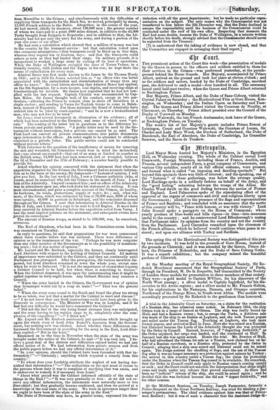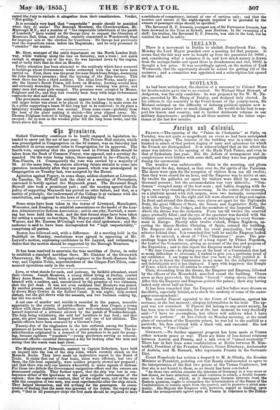Lord Mayor Moon feasted her Majesty's Ministers, in the gyt&an
Hall, on Wednesday evening. The whole of the Cabinet except Lord Cranworth, Foreign Ministers, including those of France, Austria, and Prussia, several independent Peers, a great company of Commoners, and various City notables nearly all in full official costume, were present, and formed what is Called "an imposing and dazzling spectacle.' But beyond this spectacle there was little of interest ; and the speaking, one of the " features " of these gatherings, was below the average quality. Lord Hardinge spoke in a soldierly fashion on behalf of the Array, and the "good feeling" subsisting between the troops of the Allies. Sir Charles Wood dwelt on the good feeling between the navies of France and England. Lord Palmerston spoke of the stimulating effect of the approval of the organs of commerce and civil and religious liberty upon the Government; alluded to the presence of the flags and representatives of France and Sardinia ; and concluded with an assurance that the motto of-this country will be, "Peace with honour, or war with victory." Lord John Russell spoke a panegyric on the Nouse of Commons; whose yearly produce of blue-books and bills ripens—in time—into measures useful to the country ; and he,cantroverted Lord Ellenborough's saying that Parliament takes its opinions from the country and not the country from the Parliament. Lord Clarendon remarked upon the closeness of the French alliance, which he believed would continue when peace is re- stored ; and upon our alliance with Turkey and Sardinia.
The spring fete of the Horticultural Society was distinguished this year by two incidents. It was held in the grounds of Gore House, instead of the grounds at Chiswick ; and it was attended by the Queen, Prince Al- bert, the Princess of Hohenlohe, and the Duke of Saxe Coburg Gotha. It was a superb exhibition; but the company missed the beautiful gardens of Chiswick.
At the Monday meeting of the Royal Geographical Society, Sir Ro- derick Murchison announced that the Geographical Society of Paris, through its President M. Be la Roquette, had transmitted to the Society of London three medals for presentation to three members of that society. They were—a gold medal to Captain M'Clure for his discovery of the North West passage ; a silver medal to Captain Inglefield, for his dis- coveries in the Arctic regions; and a silver medal to Mr. Francis Genoa, for his explorations in the Namaqua, Damara, and Ovampo countries, Northward of the Orange River, in South-west Africa. The medals were accordingly presented by Sir Roderick to the gentlemen thus honoured.
A trial in the Admiralty Court on Saturday, on a claim for the restitution of a Russian ship, has attracted some notice. In February 18.54, the ship Odessa took in a cargo of linseed at Odessa. The ship was really bound for Hull, and had a Russian owner; but, to escape the Lurks, a fictitious sale was made of the ship to an Italian at Leghorn and she took Tuscan papers and sailed under the Tuscan flag. Touching at Leghorn, she took more formal papers, and arrived at Hull in June. Here she was seized as a Russian, but liberated because the Lords of the Admiralty thought she was protected by the Order in Council. Instead, however, of "departing forthwith," as the Order enjoined, her cargo was landed, and she continued at Hull. In January last she was again seized. Hence the trial. Mr. Bowden of Hull, who had advertised the Odessa for sale as a Tuscan, now claimed her on be- half of a Russian merchant, as a Russian ship, protected by the Order in Council ; alleging that a ship once seized and liberated could not be seized again. The Judge noticed the shuffling of flags, and the use of the Tuscan flag after it was no longer necessary as a protection against seizure by Turkey ; the arrival in this country under a Tuscan flag; the claim for protection under the Russian when the Tuscan flag ceased to be available. He remarked, that the Order in Council could only apply to Russian vessels coming openly as euth ; and the Court could not sanction the interpretation that ships might come and trade under any colours that proved convenient As there had been no "judicial" release of the ship, she could be seized again ; and he decided that she was forfeited because she did not "depart forthwith," and for other reasons.
At the Middlesex Sessions, on Tuesday, Joseph Parmenter, formerly a Police-Sergeant on the Great Northern Railway, was tried for stealing a pas- senger's portmanteau. The :chief evidence against him was that of Police- man Radioed; but it was of such a character that the Assistant-Judge di-
rected the Jury to exclude it altogether from their consideration. Yerclict, "Not guilty."
It is certainly very hard that " respectable " people should be punished when they do amiss ! The Borough Members, the Churchwardens, Mr. Murrough M.P., and a number of "the respectable inhabitants of the parish of Lambeth," have waited on Sir George Grey to request the liberation of Messieurs Ball, Giles, and Arding, recently committed to Wandsworth Gaol for improper acts at the election for Guardians : Sir George had previously read the depositions taken before the Magistrate; and he only promised to "consider" the matter.
Mr. Dyer, manager of the cattle department on the North London Rail- way, while walking along the line on Saturday, met a train ; not quick enough in stepping out of the way, he was knocked down by the engine, and so badly hurt that he died on Monday.
Public attention has been attracted to the accidents which have occurred to buildings where Government works connected with the war have been carried on. First, there was the great fire near Blackfriars Bridge, destroying Sir John Rennie's premises - then the burning of the Etna battery. This week there has been a third accident. The Atlas Iron-Works, nearly oppo- site the Queen's Bench Prison, fell down on Monday, hurting several men and seriously wounding five. Fortunately some warning was given, and many men and some girls escaped. The premises were occupied by Messrs. Polglasse and Co., and they had recently been busy with large Government contracts for shot and shell.
The proximate cause of the accident appears to have been this. A new and larger boiler was about to be placed in the building ; to make room for it, a pillar supporting a beam 99 feet long had to be removed ; in its place a temporary wooden support was erected. From BO= cause—probably from the heat of the place making it shrink—this prop Blipped away. Mr. Thomas Polglasse noticed it falling, raised an alarm, and himself narrowly escaped ; for as soon as the wooden pillar fell the long beam broke, and the floors above fell in



























 Previous page
Previous page